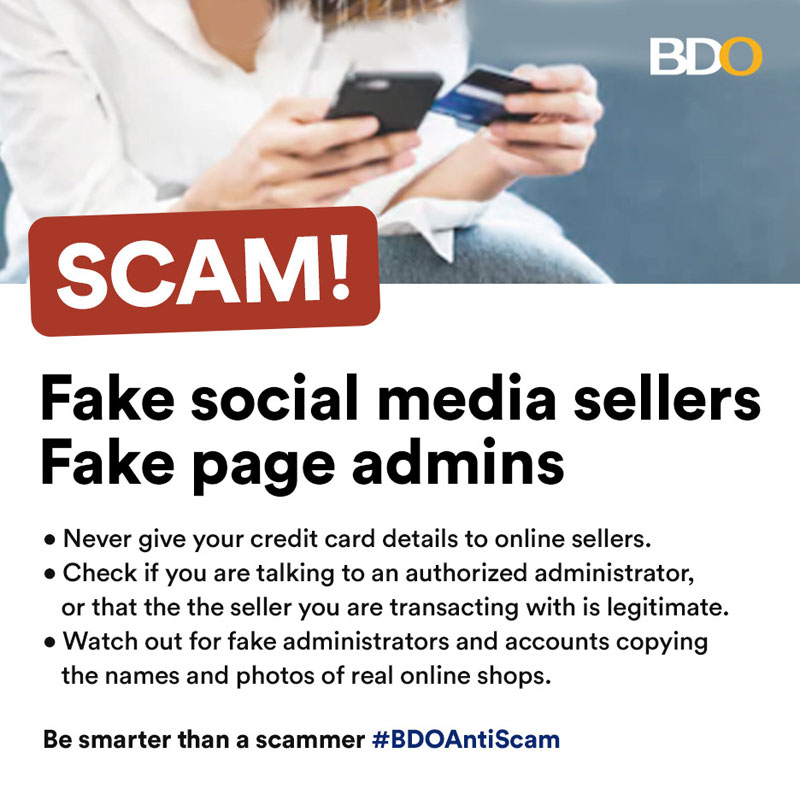The ‘new normal’ brought about by the Coronavirus Disease 2019 (COVID-19) pandemic has driven more and more people to shop online for their necessities and other commodities. Unscrupulous individuals have also seized the opportunity to scam people online as fake sellers.
Some of these scammers, often pretending to be page administrators of online shops, bait victims with attractive deals. They lure interested buyers in social media and messaging app communities, and urge them into making a deposit immediately to seal the deal. After getting the payment, they become unreachable.
While not all are scammers, some are—so it’s urgently crucial to stay vigilant and get to know them well before sending them money. Here are some of the red flags you need to identify a fake online seller:
Spotting social media seller scammers
1. They offer branded products with prices that are unbelievably lower than their market prices. “All in na po ‘yan!” is a common assurance. As the saying goes: “If it sounds too good to be true, it probably is.”
2.They build big expectations to entice and excite the buyer, but do not provide sufficient information about the product’s history and features. “Orig po ‘yan, galing sa US, good quality!” Oftentimes, they give inconsistent answers when buyer clarifies.
3. They are vague and elusive. They provide little to no information about deliveries or return/refund policies. “Ipa-deliver po namin sa address inyo pag napadala nyo na ang print screen ng bayad” is a usual promise. They also do not have contact information on their profiles.
4. They insist on immediate payments and outside the legitimate shopping website or platform, often via direct deposits to their accounts. “Last stock na po ‘to! Para po masiguradong makuha nyo po ‘to, ipadala nyo na po yung bayad sa bank account ko po imbes po sa shopping website.” They may even offer additional discounts to be more persuasive and rush the purchase.
5. As an alternative payment method, they may ask for the buyer’s credit card numbers to make the transaction themselves. They may even ask for personal information, including birth dates, mother’s maiden name, and other unique details.

PM is key?
“Other fake social media sellers post “PM is key,” which means buyers should send them a private message to know the product’s price and other details. This tactic is a red flag and against the law. The Republic Act (RA) No. 7394 or the Consumer Act as well as RA No. 7581 require all sellers to display product prices explicitly,” BDO Unibank said.
Non-compliance, according to the Department of Trade and Industry (DTI), can result in a fine from P5,000 to P2 million and may face maximum imprisonment of 15 years. Consumers may report vendors, online or otherwise, who violate this law to the DTI.
Protecting personal information
With the new normal driving more people to shop online, BDO Unibank reminds its clients to be wary of vendors they negotiate with on social media. The company reminds clients to never allow anyone to make transactions on their behalf by providing their personal information.
“Never give your personal information to anyone because this can be used to steal your identity and money from your bank account. Personal information includes your One-Time Pins (OTPs) which serves as another layer of protection when you bank online,” the bank said.
OTPs can be used once and only within a short span of time. They are unique six-character codes sent by the bank to complete a mobile number’s registration to BDO Online Banking, and confirm an online transaction.
About BDO Unibank, Inc.
BDO is a full-service universal bank which provides a wide range of corporate and retail banking services. These services include traditional loan and deposit products, as well as treasury, trust banking, investment banking, private banking, rural banking, cash management, leasing and finance, remittance, insurance, retail cash cards and credit card services.
BDO has the country’s largest distribution network, with over 1,400 consolidated operating branches and more than 4,400 ATMs nationwide. It also has 17 overseas remittance and representative offices (including full-service branches in Hong Kong and Singapore) in Asia, Europe, North America and the Middle East.
BDO ranked as the largest bank in terms of total assets, loans, deposits and trust funds under management based on published statements of condition as of March 31, 2020. For more information, please visit www.bdo.com.ph.



